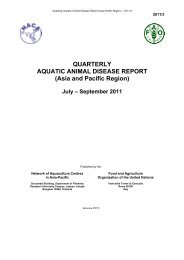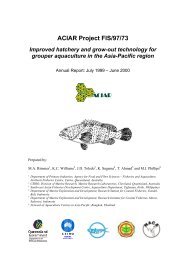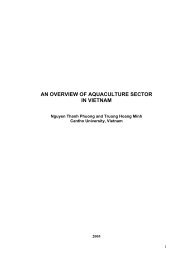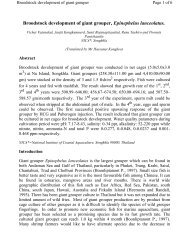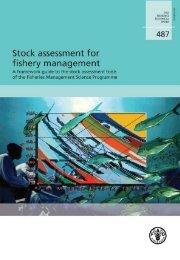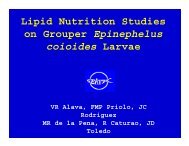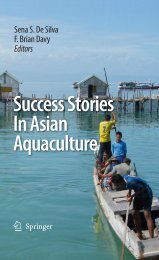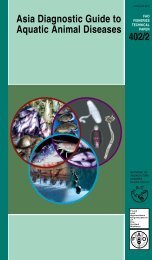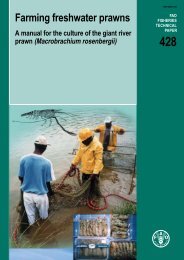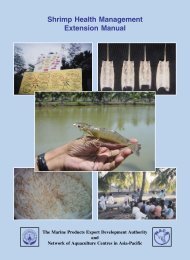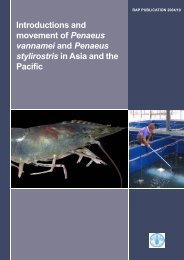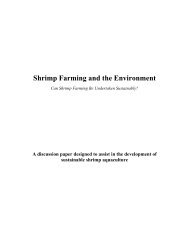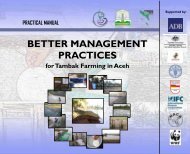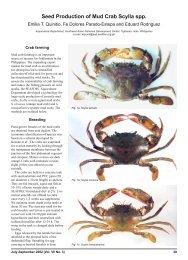Training of Trainers - Library - Network of Aquaculture Centres in ...
Training of Trainers - Library - Network of Aquaculture Centres in ...
Training of Trainers - Library - Network of Aquaculture Centres in ...
- No tags were found...
Create successful ePaper yourself
Turn your PDF publications into a flip-book with our unique Google optimized e-Paper software.
Organization <strong>of</strong> small scale farmers and its benefitsN.R. UmeshNational Centre for Susta<strong>in</strong>able <strong>Aquaculture</strong>, India. MPEDA(M<strong>in</strong>istry <strong>of</strong> Commerce & Industry, Govt. <strong>of</strong> India), Plot No.8, SBI Officers’ Colony,Rajendra Nagar, Kak<strong>in</strong>ada – 533 003 Andhra Pradesh, India.AbstractThe small farmer especially <strong>in</strong> market economies, need the strength that groups can <strong>of</strong>fer for their economic andsocial advancement. NaCSA is currently mak<strong>in</strong>g efforts to unite farmers under a cluster based programme viz:aquaculture societies for popularization <strong>of</strong> Better Management Practices (BMPs) and susta<strong>in</strong>able production. Theconcept <strong>of</strong> participatory farm<strong>in</strong>g has become very popular among farmers. The farmers <strong>in</strong> organized societiesmov<strong>in</strong>g from be<strong>in</strong>g passive recipients <strong>of</strong> <strong>in</strong>formation, services and regulations to a situation where they take fullresponsibility for their own development and use public and private <strong>in</strong>stitutions as resource providers. As <strong>of</strong> now,more than 270 aquaculture societies have been registered <strong>in</strong> various coastal states, and NaCSA is play<strong>in</strong>g asignificant and lead role <strong>in</strong> mobiliz<strong>in</strong>g and organiz<strong>in</strong>g the small scale farmers. The organization <strong>of</strong> small scalefarmers <strong>in</strong>to groups and then <strong>in</strong>to more formal societies facilitated the adoption and implementation <strong>of</strong> the BMPs,provid<strong>in</strong>g opportunity for farmers share their experiences among fellow farmers, provided better barga<strong>in</strong><strong>in</strong>g power<strong>in</strong> purchase <strong>of</strong> quality <strong>in</strong>puts thus elim<strong>in</strong>at<strong>in</strong>g middlemen. The societies also <strong>of</strong>fer better opportunity for common<strong>in</strong>frastructure development and to reduce cost <strong>of</strong> production. Societies are an ideal model for small scale farmersto meet the market requirements. Even the seafood buyers are look<strong>in</strong>g for material produced from such sourcesas several <strong>of</strong> the market conditions are met by the farmer societies. Societies help def<strong>in</strong>e and operationalize anorganisational management model for access<strong>in</strong>g <strong>in</strong>ternational markets and improve technical, f<strong>in</strong>ancial andenvironmental susta<strong>in</strong>ability <strong>of</strong> farm operations. Increas<strong>in</strong>g number <strong>of</strong> societies <strong>in</strong> India are provid<strong>in</strong>g anopportunity for <strong>in</strong>creased stakeholder <strong>in</strong>teraction and <strong>in</strong>volvement for their mutual benefit. Through societiesabandoned ponds have been revived help<strong>in</strong>g to susta<strong>in</strong> livelihoods <strong>of</strong> small farmers.IntroductionCoastal aquaculture <strong>in</strong> India is synonymous with shrimp aquaculture and ma<strong>in</strong>ly carried out by small scalefarmers. More than 90% <strong>of</strong> the farmers belong to small scale category with hold<strong>in</strong>gs <strong>of</strong> less than 2.00 ha per<strong>in</strong>dividual (MPEDA). Small scale producers have <strong>in</strong>herent difficulties such as obta<strong>in</strong><strong>in</strong>g quality <strong>in</strong>puts, like shrimpseed and feed, at good prices, access<strong>in</strong>g resources and services, comply<strong>in</strong>g with market requirements (e.g. foodsafety standards, traceability, certification etc.) and access<strong>in</strong>g markets for their products. Mar<strong>in</strong>e Products ExportDevelopment Authority (MPEDA), M<strong>in</strong>istry <strong>of</strong> Commerce and Industry, Govt. <strong>of</strong> India, has felt the need toempower the small scale farmers at the grassroots level by organiz<strong>in</strong>g farmers <strong>in</strong>to <strong>Aquaculture</strong> Societies andnetwork<strong>in</strong>g them with a centralized agency for adopt<strong>in</strong>g Better Management Practices (BMPs) and to help farmersavail many other benefits. In this background the National Centre for Susta<strong>in</strong>able <strong>Aquaculture</strong> (NaCSA) which isan outreach organization <strong>of</strong> MPEDA was established <strong>in</strong> 2007 with the objective <strong>of</strong> provid<strong>in</strong>g technical support tothe primary aquaculture societies and build capacity among small farmers to produce quality shrimps <strong>in</strong> asusta<strong>in</strong>able manner.The five year collaborative project work <strong>of</strong> MPEDA-NACA (2002-2006) provided the basis for the establishment <strong>of</strong>NaCSA. NaCSA is build<strong>in</strong>g capacity at grass root level through dissem<strong>in</strong>at<strong>in</strong>g technologies and <strong>in</strong>formation onbetter practices, susta<strong>in</strong>able and judicious utilization <strong>of</strong> the resources to produce safe and susta<strong>in</strong>able shrimp.Initially farmers were motivated and persuaded to form the societies by the MPEDA-NACA and NaCSA staff but <strong>in</strong>107



